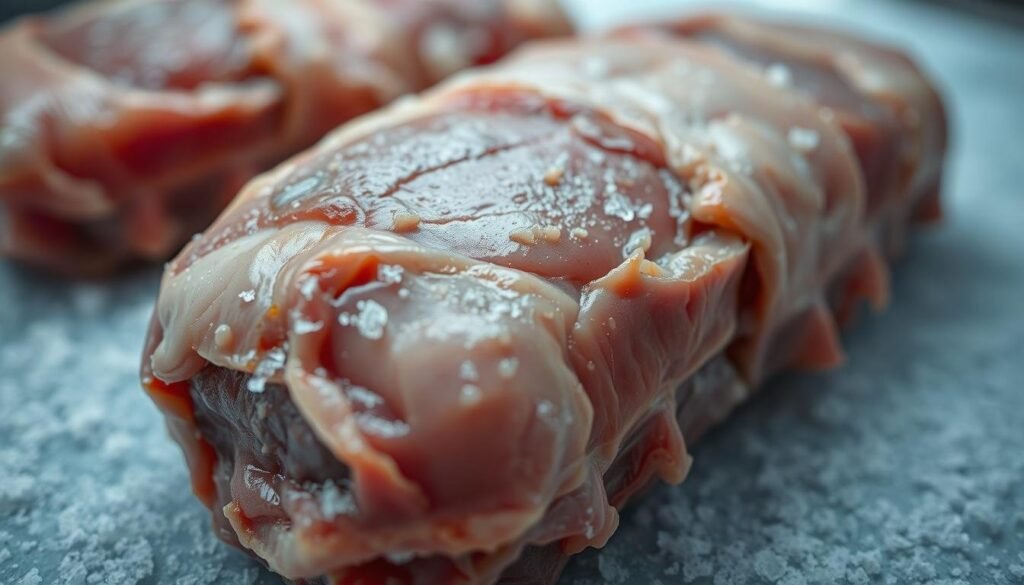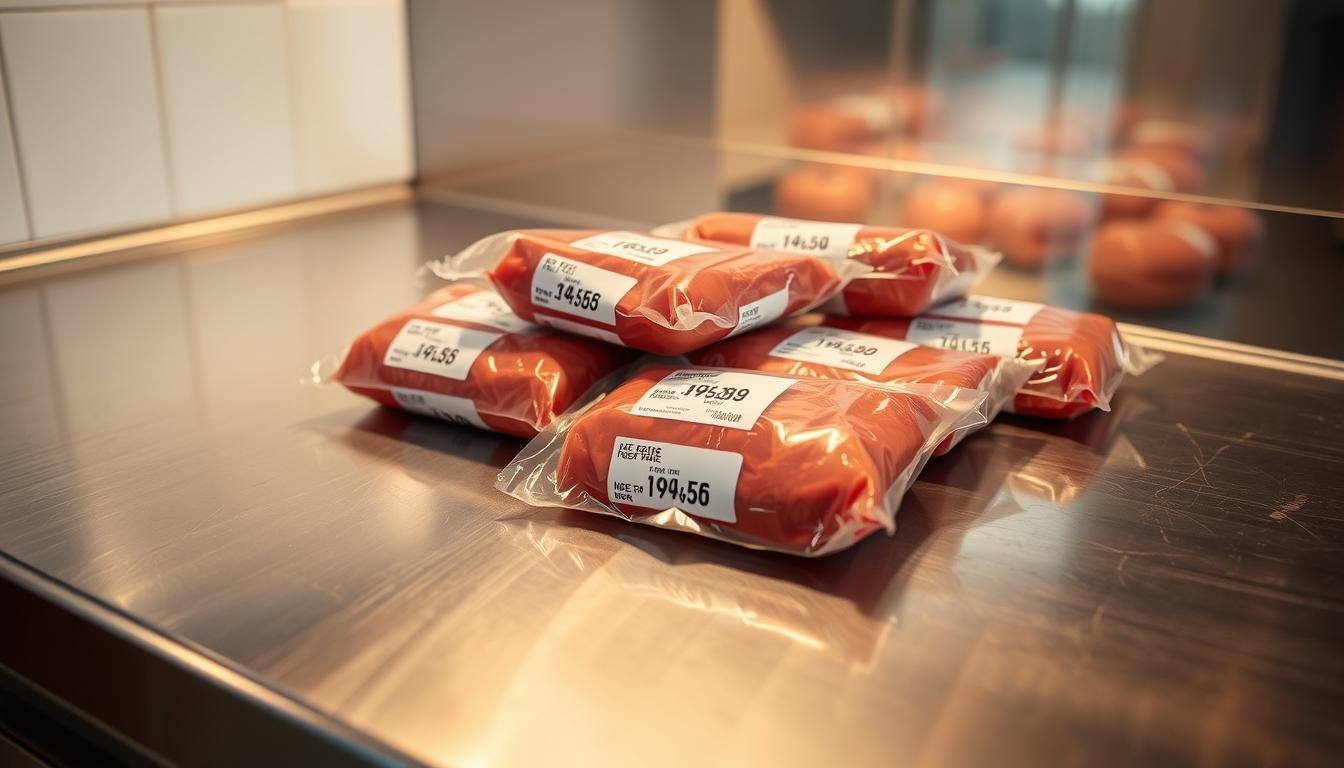Last updated on August 25th, 2025 at 04:31 pm
Many people wonder if frozen meat is safe and good to eat after its expiration date. You’re not the only one with this question.
It’s important to know about meat expiration dates and how freezing affects meat quality. Expiration dates tell us when the meat is at its best, not if it’s safe.
Freezing meat stops bacteria and other harmful germs from growing. This makes it safe to eat even after the expiration date. But, the meat’s quality might not stay the same over time.
Contents
- 1 Understanding Meat Expiration Dates
- 2 Can You Eat Frozen Meat After Expiration Date?
- 3 How Freezing Affects Meat Quality and Safety
- 4 Signs That Frozen Meat Has Gone Bad
- 5 Best Practices for Freezing and Storing Meat
- 6 Conclusion
- 7 FAQ
- 7.1 What does the "Sell By" date on meat products mean?
- 7.2 How does freezing affect the safety of meat?
- 7.3 Can you eat frozen meat after its "Use By" date?
- 7.4 What are the signs that frozen meat has gone bad?
- 7.5 How should you store meat in the freezer to maintain its quality?
- 7.6 Does freezing affect the nutritional value of meat?
- 7.7 How long can you safely store frozen meat?
Understanding Meat Expiration Dates
To make informed decisions about the meat you buy, it’s key to know the different expiration dates. Meat expiration dates are not random numbers. They show the product’s quality and safety.
Meat products often have “Sell By,” “Use By,” and “Best If Used By” dates. Each has its own purpose.
Sell By Date vs. Use By Date
The “Sell By” date is for retailers. It tells them how long to sell the product. It’s about managing stock, not safety.
The “Use By” date is for the consumer. It’s the last day the product is at its best quality. It’s about quality, not safety.
- The “Sell By” date is for store inventory management.
- The “Use By” date indicates the last day the product is at its best quality.
- “Best If Used By” date refers to the peak quality of the product.
Knowing these dates helps you choose safer meat. It follows food safety guidelines.
By understanding these dates, you can manage your meat better. This ensures it’s safe and of good quality when you eat it.
Can You Eat Frozen Meat After Expiration Date?
Freezing meat can make it last longer, but can you eat it after it expires? The answer depends on how freezing changes the meat’s quality and safety.
Freezing stops bacteria and pathogens from growing because of the cold. So, frozen meat is safe to eat for a long time if stored at 0°F (-18°C) or below. But, the meat’s quality can get worse over time, affecting its taste, texture, and nutrients.
The expiration date on meat is for quality, not safety. If you froze your meat before this date, it’s probably still okay. But, always check the meat for spoilage signs like bad smells, slimy texture, or mold.
To keep frozen meat in good shape, follow the right freezing and storage steps. Wrap the meat well to avoid freezer burn, label it with the date, and keep it at the right temperature.
Here are some important things to think about with frozen meat:
- Storage conditions: Was the meat stored at 0°F (-18°C) or below?
- Packaging: Is the meat properly wrapped to prevent freezer burn?
- Inspection: Check for signs of spoilage before consuming.
In short, you can eat frozen meat after its expiration date if it’s been stored right and doesn’t show spoilage. But, the quality might not be the same, so always check the meat before eating it.
How Freezing Affects Meat Quality and Safety
Freezing meat can change its texture and safety. Ice crystals form when meat freezes, making it softer or mushier when thawed. This is because the freezing process alters the meat’s structure.
The freezing method also affects meat quality. Slow freezing can damage the meat more because of larger ice crystals. Quick freezing, however, forms smaller crystals, helping to keep the meat’s texture better.
Effects on Nutritional Value
Freezing can also reduce the nutritional value of meat. While it preserves many nutrients, some are lost, especially if the meat is not packaged well or stored for too long. Vitamins B and C are more likely to break down during freezing and storage.
| Nutrient | Effect of Freezing | Storage Impact |
|---|---|---|
| Protein | Minimal loss | Remains stable |
| Vitamin B | Some degradation | Loss increases with time |
| Vitamin C | Significant degradation | High loss during prolonged storage |
Proper storage is key to keeping meat quality and nutritional value high. Make sure meat is packaged right and stored at a steady freezer temperature. Also, label and date the meat to ensure it’s eaten within a safe time frame.
Knowing how freezing impacts meat helps you keep it quality and safe. Pay attention to the freezing method, storage conditions, and how long you store it.
Signs That Frozen Meat Has Gone Bad
It’s important to know when frozen meat has spoiled. Even if stored right, it can still go bad over time. This can make it unsafe to eat.
To check if your frozen meat is bad, look closely. First, examine its appearance. Look for discoloration, slime, or mold. If it looks different or has an odd color, it might be spoiled.

Smell and texture are also key. When thawed, check its smell. A bad smell means it’s likely spoiled. Also, feel its texture. If it feels slimy or soft in a way that’s not normal, it’s best to throw it away.
Other signs of bad frozen meat include:
- Freezer burn, which can make the meat dry and taste bad
- Ice crystals or frost inside, showing it’s been affected by temperature changes
- Packaging damage, like tears or holes, letting in contaminants
Knowing these signs helps keep your frozen meat safe. Always be careful with frozen meat. If unsure, it’s safer to throw it away to avoid getting sick.
Best Practices for Freezing and Storing Meat
To keep your frozen meat fresh, follow some key steps. Proper freezing and storage are crucial for meat quality and safety.
When freezing meat, use airtight, moisture-proof wrapping. This prevents freezer burn. Freezer bags or tight plastic wrap or foil work well.
Optimal Freezer Storage Conditions
Your freezer must be at 0°F (-18°C) or below. This stops bacteria from growing. Keeping the temperature steady is also important for meat quality.
Label and date your frozen meat for easy tracking. Store raw meat in a covered container or sealed bag. This prevents contamination with other foods.
By freezing and storing meat correctly, you can enjoy it longer. This way, you keep it safe and of high quality.
Conclusion
You now know why meat expiration dates are important. Freezing can keep meat safe and good to eat even after its expiration date. But, it’s key to follow food safety guidelines to avoid getting sick.
To safely eat your frozen meat, always check for signs of spoilage first. Keeping it stored and handled right is crucial. This way, you can enjoy your frozen meat safely and reduce the risk of getting sick.
Being careful with your frozen meat’s storage and expiration dates is smart. Always handle and store it properly. This ensures the meat stays safe to eat.
FAQ
What does the "Sell By" date on meat products mean?
The “Sell By” date is when stores should sell the product. It helps them keep older items from expiring.
How does freezing affect the safety of meat?
Freezing stops bacteria and viruses from growing, making meat safe. But, freezing doesn’t kill all bacteria. So, it’s important to thaw and handle frozen meat safely.
Can you eat frozen meat after its "Use By" date?
The “Use By” date is when the product is at its best. Frozen meat is still safe after this date if stored right and looks good.
What are the signs that frozen meat has gone bad?
Bad signs include bad smells, slimy texture, and mold. Always check your meat before eating it.
How should you store meat in the freezer to maintain its quality?
Store meat in airtight containers to avoid freezer burn. Label them with the date and contents. Keep your freezer at 0°F (-18°C) or below.
Does freezing affect the nutritional value of meat?
Freezing might slightly reduce some vitamins like B and C. But, the loss is small, and frozen meat is still nutritious.
How long can you safely store frozen meat?
Storage time varies by meat type and conditions. Generally, frozen meat is safe forever if stored right. Always check for spoilage before eating.

Hello, I am Bellamy George, a certified nutritionist and food safety specialist from Springfield, IL. With a degree in Food Science, I share research-backed insights on edible foods, seeds, and seafood for safe, informed eating.

